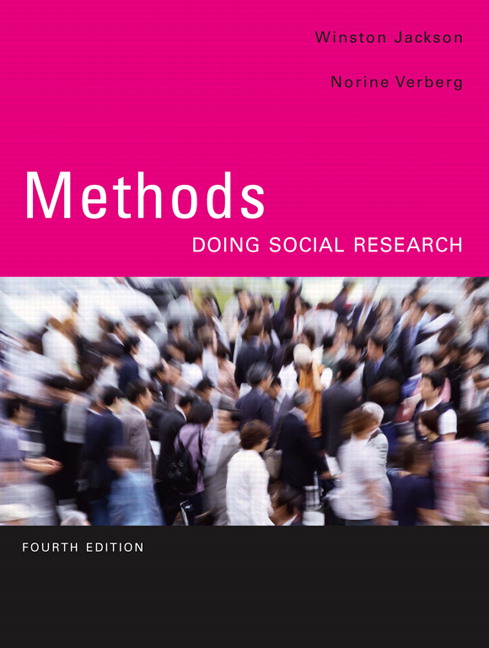Test Bank for Methods: Doing Social Research, 4/E 4th Edition Winston Jackson, Norine Verberg
$35.00
Test Bank for Methods: Doing Social Research, 4/E 4th Edition Winston Jackson, Norine Verberg
You will receive this product immediate after placing the order
All resources are in electronic format and can be downloaded from your account or email – How to Download. Payments will be processed instantly after checkout. Please note that all sales are final and non refundable. If you still have questions, find answers on our FAQ page or just send us an email at [email protected], we will respond as soon as possible.
Chapter 2. Explaining
MC 2-1
The function of theory is to:
a. explain behaviour of humans and institutions
b. explain patterns in the social world
c. offer testable explanations for observed relationships
d. all of the above
Answer: D
Difficulty: Easy
Page: 26
MC 2-2
Validity refers to the extent which:
a. on repeated measures, an indicator will yield similar readings
b. a particular measure reflects the concept being studied
c. a study being conducted is valuable to society
d. a study being conducted is valuable to the scientific community
Answer: B
Difficulty: Easy
Page: 28
MC 2-3
Reliability refers to the extent to which:
a. on repeated measures, an indicator will yield similar readings
b. a particular measure reflects the concept being studied
c. a study being conducted is able to produce the same results as previous studies of a similar character
d. none of the above
Answer: A
Difficulty: Easy
Page: 28
MC 2-4
Deductively speaking, if A causes B, and if B causes C, then which of the following must be true:
a. A causes C
b. A does not cause C
c. only B causes C
d. none of the above
e. all of the above
Answer: A
Difficulty: Easy
Page: 28
MC 2-5
Deductive reasoning begins at the:
a. conceptual stage
b. theoretical stage
c. operational stage
d. b and c but not a
Answer: B
Difficulty: Moderate
Page: 28
MC 2-6
Which of the following is not a component of formal theory:
a. conceptual scheme
b. set of propositions
c. set of statistical figures
d. contingency of stated propositions
Answer: C
Difficulty: Easy
Page: 30
MC 2-7
The power of a theory refers to:
a. the number of scientists who subscribe to it
b. the number of propositions that can be derived from it
c. the number of times it is referenced in articles
d. the value of it to that of society
Answer: B
Difficulty: Moderate
Page: 30
MC 2-8
Partial theory attempts to explain:
a. an assumed or known relationship by proposing a testable causal model
b. a new model within social science by means of a causal model
c. a model borrowed from the physical sciences
d. patterned behaviour
Answer: A
Difficulty: Easy
Page: 31
MC 2-9
An axiomatic derivation is a:
a. set of logically derived statements of relationships
b. set of truisms derived from the social world
c. set of partially true statements about the social world
d. synonym for a hypothesis
Answer: A
Difficulty: Easy
Page: 35
MC 2-10
Replacement of terms refers to:
a. replacing specific components of a theory with general ones
b. replacing general components of a theory with specific ones
c. replacing theories with hypotheses
d. none of the above
Answer: B
Difficulty: Moderate
Page: 38
ES 2-1
Briefly define or describe what is meant by each of the following:
a) alternative explanation
b) partial theory
c) formal theory
d) axiomatic derivation
e) anecdotal evidence
f) causal explanation
g) empathetic explanation
h) functional explanation
i) probabilistic explanation
j) replacement of terms
Answer: ESSAY
ES 2-2
Contrast “formal theory” with “partial theory;” how would you go about testing a hypothesis related to each type of theory?
Answer: ESSAY
ES 2-3
Choose a relationship that you think would hold true and propose three alternative explanations for the relationship. Connect your proposed explanations to an existing social science perspective. Outline a study which would allow you to reject the various explanations?
Answer: ESSAY












Reviews
There are no reviews yet.